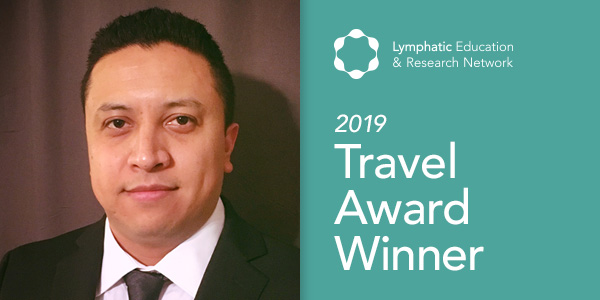Jorge A. Castorena-Gonzalez, currently a Postdoctoral Fellow at the Department of Medical Pharmacology and Physiology of the University of Missouri, under the supervision of Dr. Michael J. Davis received a Travel Award from LE&RN to attend the Lymphatic Forum in Austin, TX. We asked Jorge to share his thoughts on that experience with us and to tell us a bit about his research and future plans.
1. What did you get out of the Lymphatic Forum? Why did you feel it was important to attend?
The Lymphatic Forum is one of the very few conferences that is fully dedicated to bringing together all the groups performing research that advances what is known about the lymphatic system and lymphatic dysfunction in the world. As a postdoctoral fellow, attending this conference was extremely important because I was able to present my work, interact with others in the field, establish new collaborations, and get invaluable feedback that surely will improve my research. At the Lymphatic Forum, I was also able to hear from and interact with patients who suffer from lymphedema. I believe these patient-researcher interactions are crucial for the development of new experimental and therapeutic approaches.
2. What are your areas of interest in research?
As a postdoctoral fellow, I have been working on understanding the mechanisms underlying the coordinated, spontaneous contraction of collecting lymphatics, which are critical for efficient lymph transport. We recently showed that connexin-45 is the critical gap junction protein that mediates the electrical communication between lymphatic muscle cells. Lack of connexin-45 in lymphatic muscle cells results in uncoordinated lymphatic contractions and impaired lymph transport.
3. What are your hopes and plans for your career and your research?
My plans for the future include becoming an independent researcher. My independent research will focus on the study and understanding of how subclinical edema that results from lymphatic contractile dysfunction and lymphatic valve deficiencies in obesity and other diseases may contribute to the development of subsequent diseases (i.e. lymphedema, cardiovascular disease).
4. Why do you believe that, in general, lymphatic research is important? What might the field accomplish within the next few years?
In general, efforts dedicated to lymphatic research have fallen behind those dedicated to blood research. The increasing evidence showing that most diseases may involve a lymphatic component highlights the importance of investing more in the lymphatic field. After attending the last lymphatic forum, I believe the field will optimize and bring new therapeutic/surgical techniques for the treatment of lymphedema. And in the particular case of the subset of women developing lymphedema after intervention for breast cancer, I believe the field should focus on and will advance the understanding of the elements that determine which patients will develop lymphedema and bring new preventive treatments.
LE&RN programs, like LE&RN Travel Awards, are only possible because of our Partners and Supporting Members. Become a Supporting Member today.

